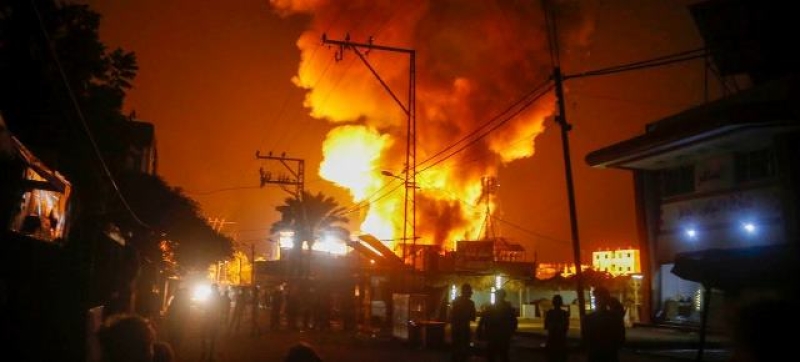- Record low ADP execution rate clouds performance in 2025 |
- Special prayers held nationwide for Khaleda after Jumma prayers |
- Vandalism at Chattogram Airport for food after flight cancellations |
- Nomination of Nagorik Oikya’s Manna, six others scrapped in Bogura |
- Bangladesh Gets Record $32.8bn Remittance in 2025 Year |
UN chief condemns rising civilian casualties in North Gaza

An airstrike in the courtyard of al Aqsa hospital in Gaza where people sought shelter. © UNRWA
14 October 2024 - The UN Secretary-General on Monday condemned the large number of civilian casualties inflicted by Israeli forces amidst their intensifying military campaign in northern Gaza.
Israeli forces struck tents sheltering displaced civilians near al Aqsa hospital, in an area where people from northern Gaza were told to relocate. At least four people were burned to death, and scores of others, including women and children, suffered severe burns.
Just hours earlier, another strike on a school turned shelter in Nuseirat killed more than 20 people and injured scores of others, according to local reports.
“[The Secretary-General] strongly urges all parties to the conflict to comply with international humanitarian law and emphasizes that civilians must be respected and protected at all times,” UN Spokesperson Stéphane Dujarric said at the regular press briefing in New York.
People stranded
In the past two weeks, over 50,000 people have been displaced from the Jabalia area, which is cut off, while others remain stranded in their homes amid increased bombardment and fighting.
The military operation has also forced the closure of water wells, bakeries, medical points and shelters, as well as the suspension of protection services, malnutrition treatment services, and temporary learning spaces.
Hospitals have also witnessed an influx of trauma injuries.
No end to the horrors
Also on Monday, Joyce Msuya, the acting UN Under-Secretary-General for Humanitarian Affairs, said that “there seems to be no end to the horrors that Palestinians in Gaza are forced to endure.”
She cited the strike near al Aqsa hospital and the school-turned-shelter in Nuseirat, stressing that “there really is no safe place in Gaza for people to go.”
“These atrocities must end. Civilians and civilian infrastructure must always be protected.”
Northern Gaza ‘cut off’
Meanwhile, escalating violence in the region is having a disastrous impact on food security for thousands of Palestinian families.
According to the UN World Food Programme (WFP), major crossings into north Gaza have been closed and no food aid has entered since 1 October.
“The north is basically cut off and we’re not able to operate there,” said Antoine Renard, WFP Country Director for Palestine.
“WFP has been on the ground since the onset of the crisis. We are committed to delivering life-saving food every day despite the mounting challenges, but without safe and sustained access, it is virtually impossible to reach the people in need.”
The agency’s last remaining food supplies in the north, including canned food, wheat flour, high-energy biscuits, and nutrition supplements, have been distributed to shelters, health facilities and kitchens in Gaza City and three shelters in North Gaza.
If the conflict continues to escalate at the current scale, it is unclear how long these limited food supplies will last and the consequences for fleeing families will be dire, WFP warned.
Southern and central Gaza
The situation in southern and central Gaza is also at a “breaking point” due to insecurity surrounding the crossing points, WFP added.
Food distributions have ceased entirely and bakeries are struggling to secure wheat flour, putting them at risk of shutting down any day. Some hot meal kitchens are still providing meals to those able to access them.
“As winter approaches, Gazans find themselves without adequate shelter, no fuel and very little aid,” WFP said, underscoring the urgent need for safe and sustained access to deliver life-saving food assistance.
More crossing points must be opened, and security ensured for staff and partners working to deliver aid, the agency added. – UN News

